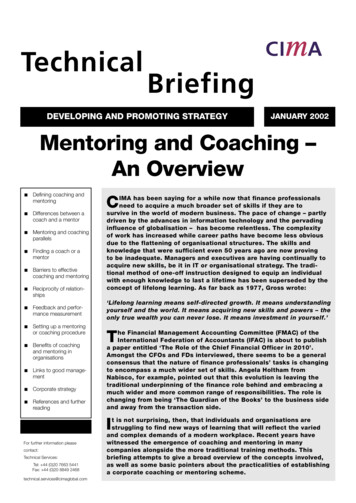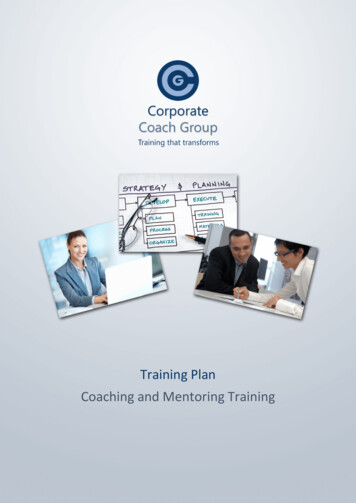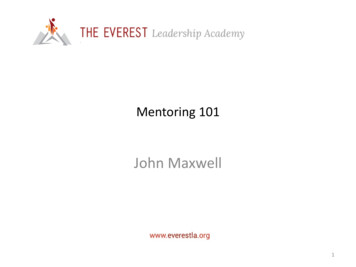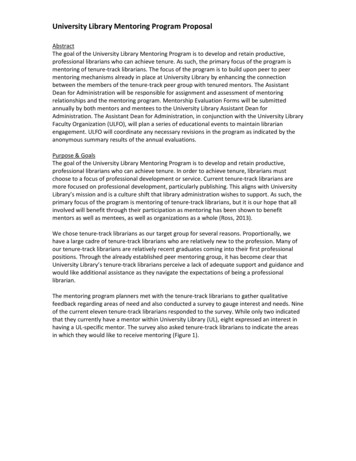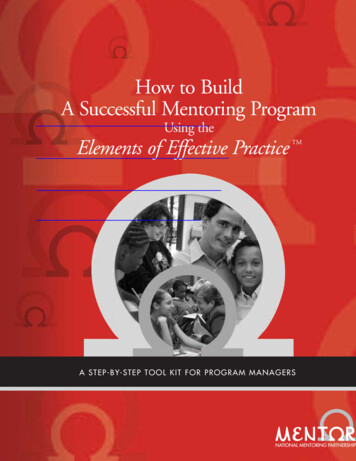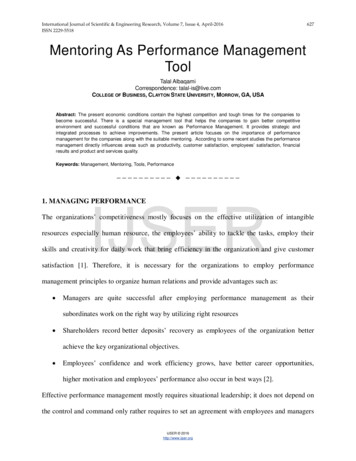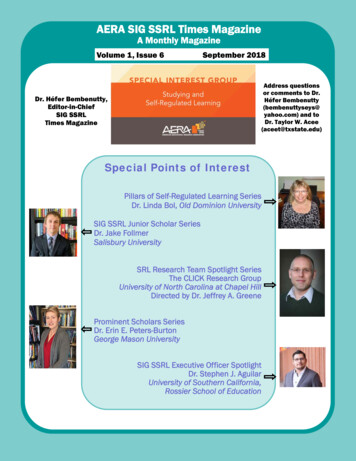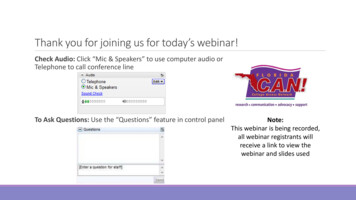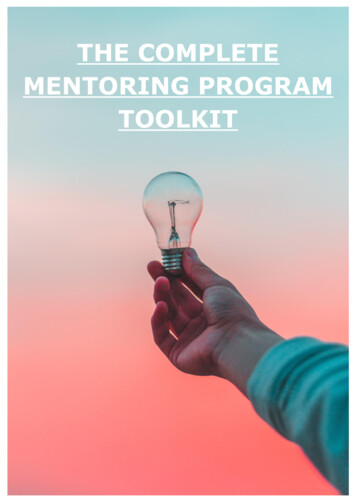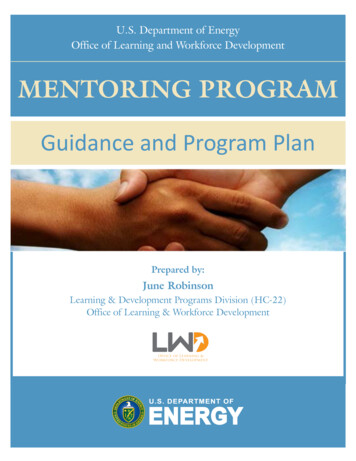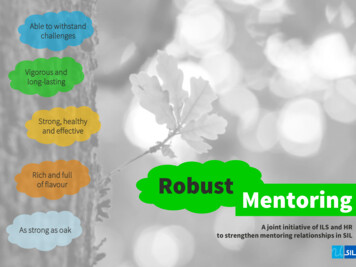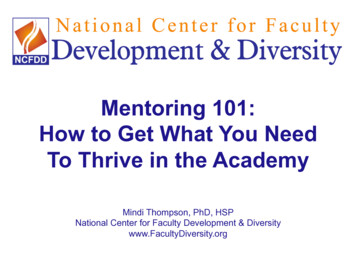
Transcription
Mentoring 101:How to Get What You NeedTo Thrive in the AcademyMindi Thompson, PhD, HSPNational Center for Faculty Development & Diversitywww.FacultyDiversity.org
Today’s Facilitator:Mindi Thompson Tenured professor atUniversity of WisconsinMadison Registered Health ServicePsychologist Faculty Success ProgramDirector of Coach Training
Today’s WorkshopPART I: Mentoring ChallengesPART II: Mentoring MistakesPART III: Rethinking MentoringPART IV: Your Mentoring Network
PART I:MENTORING CHALLENGES
TENURE-TRACK CHALLENGESThe tenure-track is stressful for ALL faculty due to: Varying degrees of preparation for ALL aspects ofthe job Minimal feedback and support Unclear criteria for promotion & tenure Ever-escalating expectations for research andfunding Need to front-load research portfolio Long probationary period (6 years) followed by aseries of high-stakes, yet anonymous votes
“SOLO” CHALLENGESAdditionally, under-represented faculty commonlydescribe: Struggling to find time for research givendiversity requests Experiencing emotional exhaustion fromdifferential classroom dynamics Managing visibility, invisibility and belonging Lack of collegial acceptance (mentors but notsponsors)
COMMON OUTCOMESAll of these challenges can lead to A negative impact on productivityduring the transitions Engaging in self-isolation as a protectivedefense mechanism Emotional exhaustion and anxiety Stress-related illness Strained relationships Thoughts of leaving the Academy
PART II:MENTORING MISTAKES
Biggest Mistakes1. You Don’t Understand THE GAMEThe Structural Challenge of Academic Work: We tend to prioritize based onaccountability The things that matter the MOST tomarketability, tenure, promotion, scholarlyreputation, mobility, and long-term successhave the LEAST built-in accountability.
Biggest MistakesYour Time Is NOT AlignedWith Your Evaluation CriteriaCriteria for Tenure &PromotionTypical New iceResearchTeachingService
New Skill: Daily WritingWrite EveryDay30-60minutesFirst thing inthemorningAcademics often imagine they must have longunbroken stretches of time to write, butthe demands of an academic careerseldom allow this luxury.Daily writing leads to steady productivity andfewer feelings of anxiety over failure tomeet expectations for productivity.Mental shift: writing is the most important partof my long term success, therefore it’s mytop priority.Behavior shift: I write every day and create away to be accountable that works for me.
Biggest Mistakes2. You Have Limiting BeliefsDifferentiating the idealfrom what’s real“It’s really all about the work, so if I justdo great work I’ll be successful.”Reactive vs. proactivestance“Everyone’s so busy, I don’t want to botheranyone with ”Hyper-individualism“I can figure everything out myself.”Perfectionism“I hold on to work until it’s perfect ”Staying Safe/Playing SmallSuper Syndrome“I only connect with people in mydepartment that I like.”“I take care of everyone else’s needs.”(while ignoring or neglecting my own).“Taking care of my needs is selfish”.
PART III:RE-THINKINGMENTORING
RE-THINKING g isreally important!“Mentoring” means differentthings to different peopleMentoring magicalrelationship between facultyIdentifying faculty needs &getting them metFaculty have the time, energy,and desire to serve as mentorsMentoring is time-intensive,invisible, & unrewarded laborOnce tenured, faculty no longerneed mentoringEvery transition requiresnew skills & supportWhat worked in the past,should work todayExpectations today are fargreater than the past
RE-THINKING MENTORINGEach step on the academic ladder is a new game with newrules (written and unwritten), new questions, and newchallenges sorGraduateStudentThe most efficient way to make a transition is to build anetwork of mentors, sponsors, and collaborators that meetnew rank-appropriate needs.
Re-Think tIntellectualCommunityAccess bility for whatREALLY MattersRoleModels
Ask: What do I need? How can I get it?SubstantiveFeedbackAccess acultyMemberAccountability for whatREALLY dels
This is Mentoringtext
PART IV:CULTIVATING A THRIVINGNETWORK
Cultivating Your MentoringNetworkTHE PROCESS:1.2.3.4.5.6.Assess your current networkIdentify your current needsAsk: How can I get my needs met?Plan to maximize your opportunitiesIdentify your limiting beliefsCommit to ACTIONIt requires knowing WHAT you need and ASKING for it!
STEP #1:ASSESS YOUR CURRENTACADEMIC NETWORK
What do YOU need? How can YOU get it?SubstantiveFeedbackAccess OU!Accountability for whatREALLY dels
WHO IS IN YOUR CURRENT MENTORING NETWORK?1.2.Internal1.2.Depariment ColeaguesProfessional Development1. - - - - - 2.3.Readeis {5ee sitelec.tucomrrunity)Substantive Fe edbackExternal1.2. ,3.- - ----4.------Pro fessional Editor1.Fninds2.3.3. - - - - - 4.1. Senior Depar1mmt Facu ySponsorsh 1. - - - - - 2.3. - - - - - 1.2.------4.Emotional SupportFamiy1.3.2.1. - - - - - -Internal t. entois3.Otier------2. - - - - - 3.4.------1.2.3.PeerMenton.1.Access to Opportunities0-25%2.3.4.41.2.External Mentors3.4.25-50%5.6.7.8.Intellectual C ommunily1.Readeis9.2.50-75%Accountability ForWhatREALLY Matters3.10.11.12.text13.75-100%1. - - - - - 2. - - - - - -14 .15.16.Role Models3. - - - - - 1.4. ------Safe Space2.3.
STEP #2:IDENTIFY YOURCURRENT NEEDS
WHAT’S MISSSING? WHAT DO YOU NEED?1.2.Internal1.2.Depariment ColeaguesProfessional Development1. - - - - - 2.3.Readeis {5ee sitelec.tucomrrunity)Substantive Fe edbackExternal1.2. ,3.- - ----4.------Pro fessional Editor1.Fninds2.3.3. - - - - - 4.1. Senior Depar1mmt Facu ySponsorsh 1. - - - - - 2.3. - - - - - 1.2.------4.Emotional SupportFamiy1.3.2.1. - - - - - -Internal t. entois3.Otier------2. - - - - - 3.4.------1.2.3.PeerMenton.1.Access to Opportunities0-25%2.3.4.41.2.External Mentors3.4.25-50%5.6.7.8.Intellectual C ommunily1.Readeis9.2.50-75%Accountability ForWhatREALLY Matters3.10.11.12.text13.75-100%1. - - - - - 2. - - - - - -14 .15.16.Role Models3. - - - - - 1.4. ------Safe Space2.3.
STEP #3:How can YOU move towardsgetting your needs met?Missing Piece:1.2.3.4.5.6.
STEP #4: How Can YouMaximize Your Opportunities?YourNextConference?WhoAlready HasWhat You Want?Who hasexpressedinterestin your work?Names: 1.2.3.1. 1.2. 2.3. 3.1.2.3.1. 1.2. 2.3. 3.Action:
STEP #5:Identify Your Limiting BeliefsLIMITING BELIEFS:Who am I to contact ?My work isn’t ready to show anyone/good enough.I may be rejected/embarrassed/humiliated.I don’t have the resources/time to .Nobody has ever helped me in the past, so nobody will helpme now.I’m afraid of .I don’t know where to find .
STEP #6:Commit to ActionWhat are THREE actions you can take THIS WEEK to moveforward?1.2.3.
The Real Secret to Mentoring: Start with a new mentoring model Identify what YOU need to thrive ASK for it!
Moving Forward
NCFDD Core CurriculumStrategic PlanningEvery SemesterNeeds A PlanManageStress & RejectionDevelop a DailyWriting PracticemV,XC.cV,C:0 ,Iro(])0::: .c ,IroIOvercomeAcademicPerfectionismEngage inHealthy ConflictCultivate aNetwork ofMentors & SponsorsThriving inthe AcademyWork-Life Balance-· (DlMove fromResistanceto WritingAlign Your Timeith Your PrioritiesMasterAcademic TimeManagementV,""'C(])The Art ofSaying "No""tJ00c.C:n-· c-t-
If today was helpful .NCFDD Membership: Monthly core workshops Monthly guest expert workshops Weekly productivity tips (Monday Motivator) Private peer-mentoring forum & monthly writingchallenges Multi-week Facilitated Learning Communities1.2.3.4.How to Write a Book ProposalHow to Write a Grant ProposalTeaching in No TimeAcademic Job Market
www.FacultyDiversity.orgFaculty Success ProgramNCFDD's signature program, the Faculty SuccessProgram is specifically designed to transform yourpersonal and professional life. It's all aboutlearning the secrets to increasing your researchproductivity, getting control of your time, and livinga full and healthy life beyond your campus.ea more GRADUATE lA TORS
Mentoring 101: How to Get What You Need To Thrive in the Academy Mindi Thompson, PhD, HS
